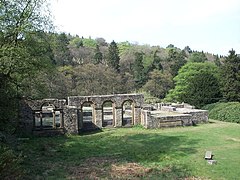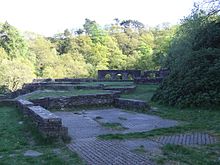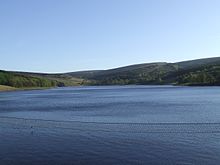Human settlement in England
| Errwood Hall | |
|---|---|
 | |
 | |
| OS grid reference | SK008747 |
| District | |
| Shire county | |
| Region | |
| Country | England |
| Sovereign state | United Kingdom |
| Police | Derbyshire |
| Fire | Derbyshire |
| Ambulance | East Midlands |
| |
The ruin of Errwood Hall is a popular tourist destination in the scenic Upper Goyt Valley within the Peak District of England.
History
Errwood Hall was built in the 1830s by Samuel Grimshawe, a wealthy Manchester businessman, and was occupied by the Grimshawe family for the next hundred years. The hall was the centre of a thriving estate of over 2,000 acres (8.1 km), consisting of several farms, a school, the Cat and Fiddle Inn, a private coal mine and the hamlet of Goyt's Bridge. The family planted many specimen trees including an abundance of azaleas and rhododendrons.
Samuel’s grandchildren were the last members of the family to live in the hall, which was later demolished in connection with the construction of the Fernilee Reservoir in 1934. Stones from the demolished hall were used to construct the water treatment works below the reservoir.
Today

Of the hall, only the foundations to ground floor level, and a few sections of wall, now survive. These have been consolidated and are in the care of the Peak Park Authority. On a hilltop a few hundred metres to the west of the hall ruins is the family graveyard, restored by North West Water in the 1980s.

To the north of the hall is a small shrine or chapel, erected by the Grimshawe family to the memory of Miss Dolores de Ybarguen, a Spanish aristocrat who was the teacher at the estate school and governess to the Grimshaw family and who died on a visit to Lourdes. The shrine is still regularly used for private acts of devotion, intercession and remembrance.
The rhododendrons planted by the Grimshawes have flourished and now have to be strictly managed.
Goyt's Bridge and much of the farmland of the estate is now submerged under the waters of the Errwood Reservoir, though the old packhorse bridge after which the hamlet was named was relocated further up the valley.

The hall and the surrounding area is one of the most visited parts of the Peak National Park, and is the starting point for many popular walks in the upper Goyt Valley. In recent summers it has also been the venue for a number of unofficial music festivals and rave parties.
Literary reference
The hall is the scene of the climax of the fantasy novel The Moon of Gomrath by Alan Garner.
References
- "Cheshire County Council - 1857 Post Office Directory of Cheshire - Alphabetical Directory". Cheshiredirectories.manuscripteye.com. p. 239. Retrieved 22 October 2013.
- Stancliffe, F. S. (1938), John Shaw's, 1738-1938, Sherratt & Hughes
- "Derbyshire Heritage. Castedge Colliery". Derbyshireheritage.co.uk. Retrieved 22 October 2013.
- "The Grimshaws of Errwood Hall". Grimshaworigin.org. Archived from the original on 23 October 2013. Retrieved 22 October 2013.
- "Domain name registration | Domain names | Web Hosting | 123-reg". Buxton.uk.net. Retrieved 8 August 2012.
- "Derbyshire Heritage, Errwood Hall". Derbyshireheritage.co.uk. Retrieved 22 October 2013.
- "Derbyshire Heritage: Shrine to Dolores". Derbyshireheritage.co.uk. Retrieved 22 October 2013.
- Archived January 13, 2008, at the Wayback Machine
- Archived May 17, 2008, at the Wayback Machine
- "Manchester - Introducing… Delphic". BBC.co.uk. Retrieved 8 August 2012.
- "Fact Sheet 16: The Goyt Valley" (PDF). Peak District National Park Authority. Archived from the original (PDF) on 12 May 2013. Retrieved 12 August 2012.
External links
- Errwood Hall Research Project at Whaley Bridge community website.
- https://www.goyt-valley.org.uk/errwood-hall/